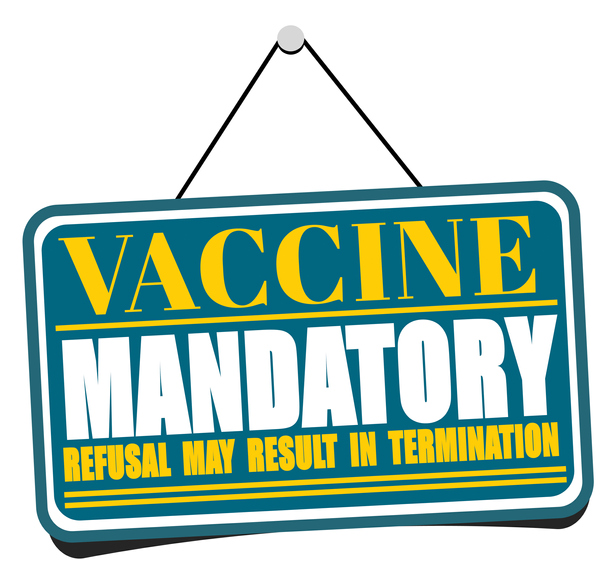Nancy Hossfeld Cuzman, R.N., a veteran nurse, came forward about losing her job after declining the COVID-19 vaccine because of underlying health conditions and other reasons.
“To me, this was the only decision I could make and sleep at night,” Cuzman said. “I feel like I’m living in an alternate universe. When did we lose the right to make decisions about our health?”
Like Cuzman, many health care workers are now stuck between gainful employment and making an informed decision about the COVID-19 vaccine.
Although even government health authorities acknowledge the COVID-19 vaccines do not stop transmission of the virus, health care workers are considered “models” for the rest of the public because of their role in taking care of sick people. If health care workers refuse the vaccine, how will the government convince other people to get vaccinated?
Staff Exodus
It is not clear how many health care workers have left their jobs over refusal to get the COVID-19 vaccination. According to an article at Fierce Healthcare, thousands of hospitals have ordered workers to get the shots, and thousands appear to have said “no,” causing a problem for hospitals.
“As a practical matter, this policy may result in exacerbating the severe workforce shortage problems that currently exist,” said Rick Pollack, the CEO of the American Hospital Association, in a statement.
Spectrum Health in Michigan appears to be sensitive to the shortage concern. According to The Detroit News, Spectrum Health will grant temporary exemptions to workers who can prove natural immunity to COVID-19. A Google search on October 7 showed no other hospitals offering such an exemption.
Worsening Nurse Shortage
Cuzman is not sure how her employer, Tucson Medical Center in Tucson, Arizona, can afford to lose health care workers.
“They were 100 nurses short prior to their mandate, and I know the last time I looked, it was 164 vacant nursing positions,” Cuzman said. “If this was a true pandemic, and they were worried about a nursing shortage, they wouldn’t be firing nurses for making personal decisions about their health.”
Tucson Medical Center did not respond to an email inquiry.
Limited Exemptions
Cuzman says her hospital told her she would no longer get paid if she did not show COVID-19 vaccination proof by September 15. Cuzman requested an exemption, in a two-page letter in which she had to divulge private health care information.
“Before a vaccine is ever recommended for use, it’s tested in labs,” Cuzman wrote. “This process can take several years. FDA [U.S. Food and Drug Administration] uses the information from these tests to decide whether to test the vaccine with people.”
The FDA granted the COVID-19 vaccines emergency use authorization after several months, not years, of testing. Pfizer and BioNTech’s Comirnaty vaccine (the brand name for its COVID-19 vaccine) received full regulatory approval in September. Weeks later, numerous employers imposed vaccine mandates, including the federal government’s order for federal workers to get vaccinations.
Concern About Comorbidities
Cuzman’s letter notes there is no long-term safety data for people like her who have autoimmune disorders.
“How can the CDC [Centers for Disease Control and Prevention] recommend [the vaccine] with no safety data?” Cuzman wrote.
The hospital made no exception in her case. Cuzman, age 63, noted in her letter there were only three conditions—pericarditis, myocarditis, and allergy— for which the hospital would grant a health exemption, and autoimmune disorders were not one of them.
Cuzman’s letter states she considers it unsettling that colleagues have cared for people who suffered severe side effects from the vaccines.
Cuzman told the hospital she was willing to follow the I-MASK+Prophylaxis and early Outpatient Treatment Protocol listed by physicians on the FLCCC Alliance website, to avoid getting the virus, and would accept twice-weekly testing the hospital requires for employees who receive exemptions.
Fired or Quit?
Cuzman, who worked for three years in the hospital’s pediatric endocrinology clinic, says she learned on October 11 her claim for unemployment benefits was approved, but it was unclear at first whether her former employer would challenge that.
“I had a conversation with someone from the Arizona unemployment office,” Cuzman said. “She asked me if I thought it was fair that I lost my job. I told her some people were granted exemptions. I was not privy to that information they submitted but it sounds like [certain] people were picked and chosen as to who would not be cut. I don’t think it was fair. Even not allowing other medical conditions, what is that? I don’t have that much faith in their decision-making.”
Dangerous Precedent
Forcing employees to receive medical treatment sets a dangerous precedent for a variety of reasons, says Twila Brase, R.N., president of the Citizens’ Council for Health Freedom and policy advisor to The Heartland Institute, which co-publishes Health Care News.
“Any and all rationales given for terminating those who refuse the [COVID-19] injection are not based on science or human rights,” Brase said. “COVID-19 is not dangerous to most people, and the injection does not stop people from getting or transmitting the virus.
“The political precedent that’s being set with this injection mandate is dangerous, not only for individual freedom and the right to make personal medical decisions but also for Americans that may suffer short-term or long-term reactions to the injection and for patients who need medical care,” Brase said.
AnneMarie Schieber (amschieber@heartland.org) is the managing editor of Health Care News.
Internet info:
“My Job or the Jab – One Nurse’s Story (Guest: Nancy Hossfeld Cuzman),” The Heartland Daily Podcast, October 7, 2021.
